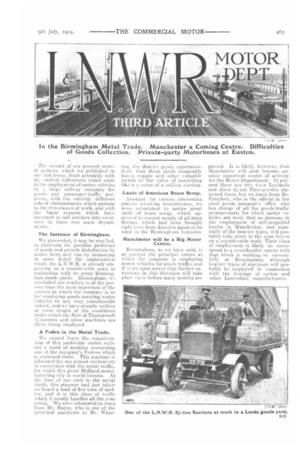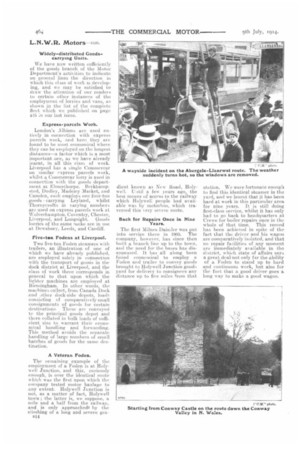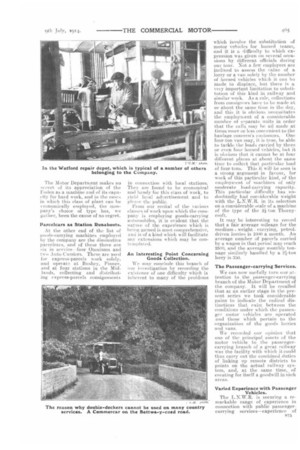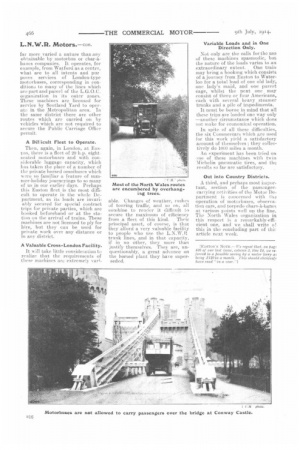In the Birmingham Metal Trade. Manchester a Coming Centre. Difficulties of Goods Collection. Private-party Motorbuses at Euston.
Page 5

Page 6

Page 7

Page 8

If you've noticed an error in this article please click here to report it so we can fix it.
the second of °lir present series of al-Utiles, which we published in our last. issue, dealt primarily with tb atheal differences which exist in the employment of motor vehicles by a. large railway company for goods and passenger-traffic purposes, •,s ith the entirely different sets of circumstances which pertain to the two classes of work, and with the basic reasons which have operated to call services into existence in these two main departments.
The Instance of Birmingham.
We proceeded, it may be recalled, to illustrate the peculiar problems of goods and parcels distribution by motor lorry and van by instancing in some detail the organization which the L.N.W.R. is already employing on a considerable scale in connection with its great Birmingham goods yards. Birmingham, we reminded our readers, is at the present time the most important of the oentres at which the compam: is so far employing goods-carrying motor vehicles to any very considerable extent, and we have already written at scone length of the conditions under which the fleet of Thornycroft
Li em and other machines are there being employed.
A Foden in the Metal Trade.
We cannot leave the consideration of this particular centre without a word of mention concerning one of the company's Fodens which is stationed there. This machine is allocated for use almost exclusively in connection with the metal traffic, for which this great Midland manufacturing city is world-famous. At the time of our visit to the metal sheds, this steamer had just taken on board a load of five tons of speller, and it is this class of traffic which it mostly handles all the year round. We were interested to learn from Mr. Hayes, who is one of the principal assistants to Mr. Whar ton, t district goods superinteo
dent, that these sheds frequently house copper and other valuable metals to the value of something like a quarter of a million sterling.
Loads of American Brass Scrap.
A moogst the various interesting parcels awaiting transference, we were astonished to notice great sacks of brass .scrap, which appeared to consist mostly of oil-lamp fittings, which had been brought right over from America again to be used in the Birmingham factories.
Manchester will be a Big Motor Centre.
Birmingham, as we have said, is at present the principal centre . at WI ich the company is employing motor vehicles for goods traffic, and it is an open secret that further extensions in this direction will take
hic(. 1.11Pre before many months are pased. It is likely, however, that Manchester will soon become. another important centre of activity for the Motor Department. At present there are two 4-ten Leylands and three 21 ton Thoroyerofts stationed there, but we learn from Mr, *Faircloth, who is the official in the chief goods manager's office who has charge of all the goods-traffic arrangements for which increase ve
hicles are used, that an in the employment of self-propelled lorries in Manchester, and especially of the heavier types, will probably take place in the Dear future on a considerable scale. Their class of employment is likely to correspond to a considerable extent with that which is working so successfully at Birmingham, although heavier types of machines will probably be employed in connection with the haulage of cotton and other Lancashire manufacturers.
Widely-distributed Goodscarrying Units.
We have now written sufficiently of the goods branch of the Motor Department's activities to indicate on general lines the direction in which this class of work is developing, and we may be satisfied to draw the attention of our readers to certain other instances of the employment of lorries and vans, as shown in the list of the complete fleet winch we published on page 4:35 ;n our last issue.
Express-parcels Work.
London's Anions are used entirely in connection with express parcels work, and here they are found to be most economical where they can be employed on the longest distances—a factor which is a most important one, as we have already learnt, in all this class of work. Liverpool has a single Commercar on similar express parcels work, whilst a Commercar lorry is used in connection with the goods department at Elinesthorpe. Berkliampsted, Dudley, Ma.deley Market, and Camden, each employs one four-ton goods carrying Leyland, whilst Thornycrofts in varying numbers are used on express parcels work at Wolverhampton, Coventry, Chester, Liverpool, and Lopgsight. Goods lorries of the same make are in use at Dewsbury, Leeds, and Cardiff.
Five-ton Fodens at Liverpool.
Two five-ton Foden steamers with trailers, an illustration of one of which we have already published, are employed solely in connection with the transport of geolis in the dock district at Liverpool, and the class of work there corresponds in general to that upon which the liOter machines arc employed at Birmingham. in other words, the machines collect, from Canada Dock and other dock-side depots, loads consisting of comparatively small consignments of goods for certain destinations. These are conveyed to the principal goods depot and there collated in bulk loads of sufficient size to warrant their economical handling and forwarding. This method avoids the separate handling of large, numbers of small batches of goods for the same destination.
A Veteran Foden.
The -remaining example of the employment of a Foden is at Holywell Junction, and this, curiously enough, is over the identical route which was the first. upon which the company tested, motor haulage to any extent. Holywell Jenction is not, as a matter of fact; Holywell town ; the latter is, we suppose, a mile and a half from the railway, and is only approachedv by the climbing of a long and severe gra
1114
dient known as New Road, Holywell. Uutil a few years ago, the best means of access to the railway which .1folyweli people had available was by motorbus, which traversed this very severe route.
Back for Repairs Once in Nine Years.
The first Milnes-Dainder was put into service there in 1905. The company, however, has since then built a branch line up to the town, and the need for the buses has disappeared. it has all along been found economical to employ a Foden and trailer to convey goods brought to Holywell Junction goods yard for delivery to consignees any distance op to five miles from that station. We were fortunate enough to find this identical steamer in the yard, and we learnt that it has been hard at work in this particular area for nine years. It is still doing first-class service, whilst it has only had to go back to headquarters at Crewe for boiler repairs once in the whole of that time. This record has been achieved in spite of the fact that the driver and his wagon are comParatively isolated, and that no repair facilities of any moment are immediately available in the district, which state of affairs says a great deal-not only for the ability of a Foden to stand up to hard and continuous work, but also felthe fact that a. good driver goes a long way to make a good wagon. The Motor Department. makes no steret, of its appreciation of the Foden as a machine and of its capacity for hard work, and in the cases in which this class of plant can be economically employed, the (loinpany's choice of type has, we gather, been the cause of no regret.
Parcelcars as Station Runabouts.
At the other end of the list of goods-carrying machines employed by the company are the diminutive pareelcars, and of these there are six in service—four °minims and two Auto-Carriers. These are used for express-parcels work solely, and operate at Bnshey, Pinner, and at four stations in the Midlands, collecting and distributing 1`X press-parcels consignments
in connection with local stations. They are found to be economical and he tidy for this class of work, to yield loeal advertisement and to please the public.
From our recital of the various classes of work upon which the company is employing goods-carrying automobiles, it is evident that the nature of the experience which is being gained is most comprehensive, and is of a kind which will facilitate any extensions which may be content plated.
An Interesting Point Concerning Goods Collection.
We may conclude this branch of mir ievestigatiOn by recording the existence of one difficulty which is inherent to many of the problems
which involve the substitution of motor vehicles for horsed teams, and it is a difficulty to which expression was given on several occasions by different officials during our tour. Not a few employers are inclined to assess the value of a lorry or a van solely by the number of horsed vehicles which it can be made to displace, but there is a very important limitation to substitution of this kind in railway and similar work. As a rule, collections from consignors have to be made at or about the same time in the day, and this it is obvious necessitates the employment of a considerable number of separate units in order that the calls may be all made at times more or less convenient to the haulage concern's cc stomerS. One four-ton van may, it is true, be able to tackle the loads carried by three, or even friar horsed vehicles, but it is obvious that it cannot be at four different places at about the same time to collect that particular load of four tons. This it will be seen is a strong argument in favour, for work of this particular kind, of the emelloyntent of imachines of only moderate load-carrying capacity. This particular difficulty has undoubtedly had considerable weight with the L.N.W.11 in its selection on a considerable scale of a machine of the type of the 2i-ton Thornycroft.
It may be interesting to record that a fair average mileage for the medium weight carrying, petroldriven lorries is 1000 a month. An average number of parcels carried by a wagon in that period may reach 2500, and tbe average monthly tonnage similarly handled by a 14-ton lorry is 350.
The Passenger-carrying Services.
We can now usefully turn our attention to the passenger-carrying branch of the Motor .Department cf the company, it will be recalled that at an earlier stage in the present series we took considerable pains to indicate the radical distinctions that exist between the conditions under which the passenger motor vehicles are operated and those which pertain to the organization_ of the goods lorries and vans.
We recorded our ,opinion that one of the Principal assets of the motor vehicle to the passengercarrying branch of a great railway was the facility with which it could thus carry out the combined duties of linking up remote districts to points on the actual railway BY Stern, and, at the same time, of creating for itself a goodwill in such areas.
Varied Experience with Passenger Vehicles.
The L.N.W.R. is securing a remarkable range of experience in connection with public passengercarrying serviees—experienee of
far more varied a nature than ave obtainable by motorbus or char-abanes companies. It operates, for example, from Watford as a centre, what, are to all intents and pur poses services of London-type motorbuses, corresponding in condition3 to many of the lines which are part and parcel of the L.G.O.C. organization in its outer zones. These machines are licensed for service by Scotland Yard to operate in the Metropolitan area. In the same districtthere are other routes which are carried on by vehicles which are not required to secure the Public Carriage Office permit.
A Difficult Fleet to Operate.
Then, again, in London, at Euston, there is a. fleet of 20 h.p. eightseated motorbuses and with considerable luggage capacity, which has taken the place of a number of the private horsed omnibuses which were so familiar a feature of summer-holiday journeyings to so many of us in our earlier days. Perhaps this Easton fleet is the roost difficult to operate in the whole Department, as its loads are invariably secured for special contract trips for private parties, which are baoked beforehand or at the station on the arrival of trains. These machines are not licensed to ply for hire, but they eau be used for private work over any distance or in any district.
A Valuable Cross-London Facility.
It will take little consideration to realize that the requirements of these machines are extremely va.ri able. Changes of weather, rushes of touring traffic, and so on, all combine to render it diffieult to secure the maximum of efficiency from a fleet of this kind. Their principal asset, of course, is that they afford a very valuable facility to people who use the L..N.W.R trunk lines, and in that capacity, if in no other, they more than justify themselves. They are, unquestionably, a great advance on the horsed plant they have super seded. Variable Loads and in One Direction Only.
Not only are the calls for the use of these machines spasmodic, but the nature of the loads varies to an extraordinary extent. One train may bring a booking which consists of a journey from Euston to Waterloo for a total Toad of one old lady, one lady's maid, and one parrot cage, whilst the next one may consist of three or four Americans, each with several heavy steamer trunks and a pile of impedimenta.
It must be borne in mind that all these trips are loaded one way only —another circumstance which does not make for economical operation.
In spite of all these difficulties, the six Commeres.rs which are used for this work yield a satisfactory account of themselves ; they collectively do 1000 miles a month.
An experiment has been tried on .ane of these machines with twin Michelin pneumatic tires, and the results so far are satisfactory.
Out into Country Districts.
A third, and perhaps most impor. tent, sectionof the passengercarrying activities of the Motor Department is comerned with the operation of motorbuses, observation ears, and torpedo chars-h.-banes at various points well up the line. The North Wales organization in this respect is a remarkably-efficient one, and we shall write ol this in the concluding part of thin: article next week.
(EDITOR'S NOTE, —We regret that, on Par, 435 of our last issue, column 3, line 14, we referred to a Possible saving by a motor lorry as being X.1.10 in a month. This should obviously have read "ins rear."]


























